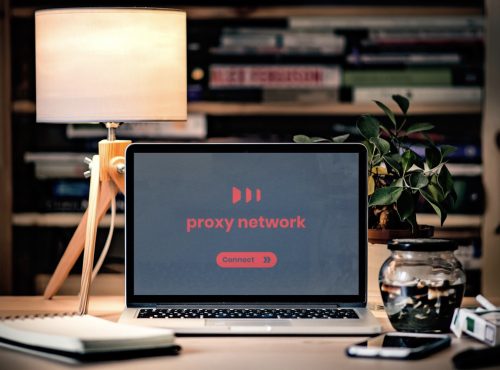
Proxy servers and VPNs tend to hide user identities and are excellent tools for anonymously accessing online content.
Because both services offer similar usage, netizens often talk about them interchangeably. Nonetheless, both differ significantly. We’ll dig into the unique differences between both and their benefits.
What Is a Proxy?
Generally, when you browse the internet, your PC connects to a particular website and downloads the pages for you to access them. This procedure is pretty simple and easy to understand.
However, when using a proxy server, your PC first sends all the traffic to the proxy. The server directs your request to the chosen website, downloads the data, and then forwards it to you.
There could be several reasons why you’d want to do this:
- You do not want to expose your identity when browsing the internet. When using a proxy, the traffic comes from the server – not your PC.
- You want to dodge content restriction. For instance, you might have subscribed to a particular service in the UK that won’t work in the USA – consider a Netflix subscription. When you connect to a proxy, it’ll appear as if you’re streaming from the UK.
Pros
Now that you know what is a proxy, check out the benefits it offers below:
- Proxies are typically free. So, you won’t be paying a fee to use them when required.
- A proxy successfully hides your IP address, allowing you to browse anonymously.
- It protects you against malware websites by restricting your access
- They are faster than VPNs because they do not encrypt your data.
- Proxies allow you to access geo-restricted sites and services
- You can restrict your employees’ internet usage by blocking their access to specific websites.
What Is a VPN?
A VPN acts similar to a proxy server in that it masks your internet traffic, and it appears to be coming from an anonymous IP address. Nonetheless, this traffic passes through an encryption channel between your PC and the anonymous VPN network.
So, where a proxy redirects only the web requests, a VPN routes and anonymizes all the network traffic coming from your PC or device.
The encrypted tunnel ensures safe internet usage. For instance, you can connect to a Wi-Fi network while sitting at a restaurant without worrying. A VPN connection won’t expose your private information to hackers or anyone willing to spy on you.
Pros
Listed below are the advantages of using a VPN.
- A VPN provides you a secure connection to public Wi-Fi
- It covers your IP address and gives you a new one
- VPN provides end-to-end encryption to provide maximum safety when browsing the internet
- All your browsing activity remains anonymous and secure if you’ve installed it on your device.
- A VPN keeps hackers from spying on your private information
- VPN compatible devices provide you with more content options online
Proxy Vs VPN: What’s the Difference?
Because both servers hide your IP address by connecting you to a remote PC, many people assume they work similarly. We’ll take a closer look at both by discussing what sets them apart.
- VPNs tend to be slower than proxies because they encrypt your sensitive information. Therefore, they may take more time. However, this can be resolved by upgrading your browsing speed and internet connection.
- You would need to pay a fee when using a VPN. A proxy server, on the other hand, is usually free. Yes, you may find free VPNs, but they limit how much data you can use within a day.
- Both proxy servers and VPNs provide privacy by hiding your IP address; however, they do it differently. A proxy acts as an intermediary between you and the web. VPN, on the flip side, uses an encryption tunnel so no one – not even your ISP – can access your data.
- Because VPNs provide end-to-end encryption, they tend to be a little more secure than proxy servers.
- A proxy server hides a single website or app at a given time. A VPN encrypts all your web activity, regardless of the app or site.
Proxy Vs VPN: Which One to Choose?
Proxies and VPNs both have their pros. However, you may prefer one over the other depending on your need. We’ll explain the use cases of both to provide a clear picture of when you should consider one and when you might want to go with another.
Use a Proxy when:
- Streaming geo-blocked content
- You want to filter content for your child
- You’re tight on budget and want a free server – that works well – to hide your IP address
- Using an old operating system
Use a VPN when:
- You’re concerned about outside threats or bothered about your sensitive information being stolen
- Wanting to connect to a public WIFI
- Living in a region with strict online surveillance
- Working with sensitive data – consider your username and password.
Conclusion
It would be wrong to consider one better than the other. Both servers offer unique benefits, and you may prefer one over the other concerning your needs.
All in all, proxies and VPNs allow you to access the web remotely by masking your IP address. The way both do them is different, however.
Interesting Related Article: “How Are Proxies Used in a Business Environment?“

